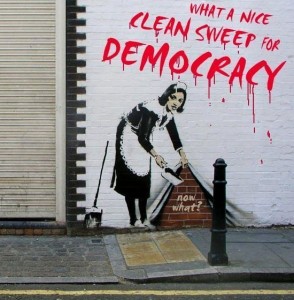The Global Economic Recovery Is Threatened By Corruption

Yesterday, the global coalition and watchdog against corruption, Transparency International, published their 2009 corruption index. As the world economy begins to recover from last year’s melt down, and some nations continue to deal with conflicts and insecurity, it is clear that no countries are immune from corruption.
The Transparency International’s 2009 Corruption Perception Index(CPI) is a measure of public sector corruption.
“At a time when massive stimulus packages, fast-track disbursements of public funds and attempts to secure peace are being implemented around the world, it is essential to identify where corruption blocks good governance and accountability, in order to break its corrosive cycle,” said Huguette Labelle, chair of Transparency International.
The vast majority of the 180 countries included in the 2009 index scored below 5 on a scale from 0 (perceived to be highly corrupt) to 10 (perceived to have low levels of corruption). The CPI measures the perceived level of public sector corruption in a given country.
Not surprisingly, fragile and unstable states, plagued by wars and ongoing conflicts, linger at the bottom of the index. These are: Somalia, with a score of 1.1, Afghanistan at 1.3, Myanmar at 1.4, and Sudan tied with Iraq at 1.5. These results demonstrate that countries which are perceived as the most corrupt are also crippled by long standing conflicts, which have torn apart their social fabric and governance infrastructure.
When essential institutions are weak or non-existent, corruption spirals out of control and the plundering of public resources feeds insecurity and impunity. Corruption also makes normal a general loss of trust in the very governmental institutions charged with ensuring stability.
“Stemming corruption requires strong oversight by parliaments, a well performing judiciary, independent and properly resourced audit and anti-corruption agencies, vigorous law enforcement, transparency in public budgets, revenue and aid flows, as well as space for independent media and a vibrant civil society. The international community must find efficient ways to help war-torn countries to develop and sustain their own institutions,” said Labelle.
The highest scorers in the 2009 CPI are New-Zealand at 9.4, Denmark at 9.3, Singapore & Sweden tied at 9.2 and Switzerland at 9.0. These scores reflect political stability, long-established conflict of interest regulations and solid public institutions. In comparison, the United States scored at 7.5, to be ranked at 19. Of the 180 countries surveyed by Transparency International, only 46 scored above 5.0.
“Corrupt money must not find safe havens, companies must cease operating in renegade financial centers,” added Labelle.
With the vast majority of the 180 countries in the 2009 index scoring bellow 5, the corruption challenge is undeniable. It is critical to address global corruption as a substantial threat to a sustainable economic future.
To read Transparency International’s 2009 Corruption Perception Index click here.
Related Articles













You must be logged in to post a comment Login